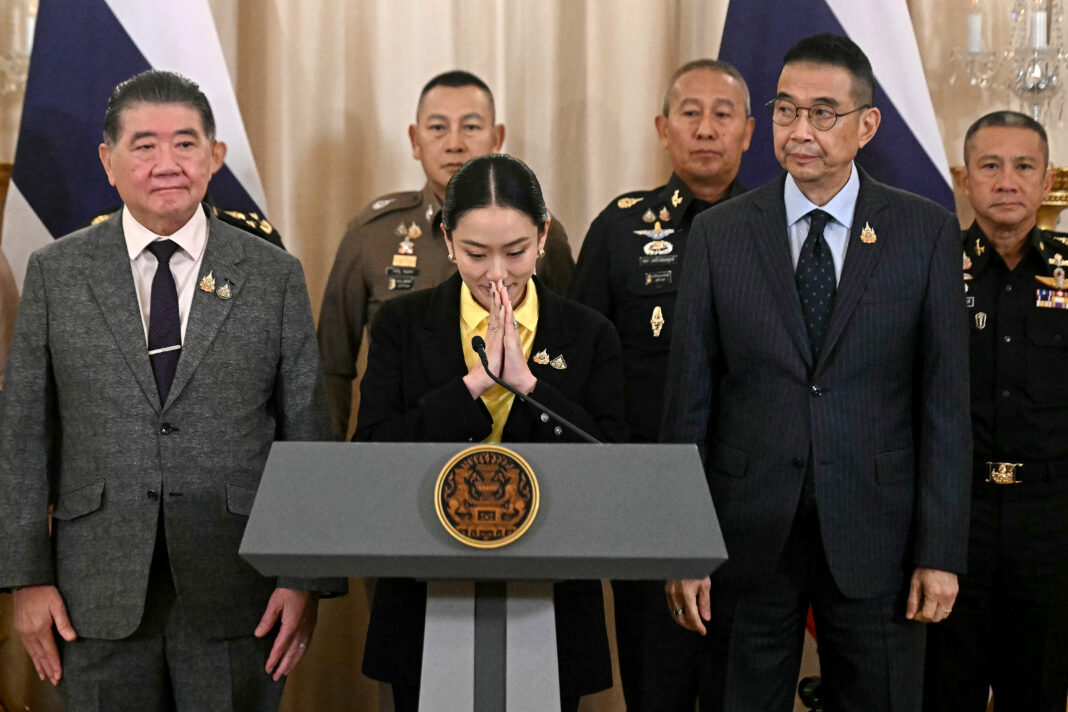By Damon WAKE/AFP – Thailand’s government is on the brink of collapse after a key coalition partner quit, leaving the kingdom facing yet another of its regular bouts of political instability.
Here’s what we know about the latest crisis rocking Thai politics:
What’s happening?
Thailand’s coalition government, headed by Prime Minister Paetongtarn Shinawatra, is in danger of collapsing after the second-biggest party in the alliance quit.
The conservative Bhumjaithai party said late Wednesday it was pulling out because of a leaked phone call between Paetongtarn and former Cambodian leader Hun Sen.
The loss of Bhumjaithai’s 69 MPs leaves Paetongtarn with barely enough votes for a majority in parliament, and if any other coalition partner leaves, her government will almost certainly crumble.
Paetongtarn apologized for the call, saying she was trying to stabilize a volatile border dispute with Cambodia and did not expect the recording to become public.
What happened in this phone call?
Paetongtarn spoke to Hun Sen on Sunday about a festering border dispute that last month broke into military clashes that left a Cambodian soldier dead.
A nine-minute portion of the call appeared online, followed hours later by the full 17-minute recording, posted by Hun Sen himself, who stepped down as Cambodian leader in 2023 but still wields great influence and is regarded as a wily political operator.
In the recording Paetongtarn addresses the veteran leader as “uncle”.
This is not unusual in Thai culture when a younger person is talking to someone much older, but it has led to accusations that Paetongtarn was being too familiar or too deferential, and that as prime minister she should have been more assertive.
Far more damaging was the fact she refers to the Thai army commander northeast as her “opponent”, sparking fury in Thailand’s highly vocal nationalist, pro-military quarters.
Thailand’s armed forces have a long history of intervening in politics and leaders are usually careful not to cross them.
The relationship between the military and the Shinawatra family is particularly sensitive, as the army has already ousted Paetongtarn’s father Thaksin Shinawatra and her aunt Yingluck Shinawatra as prime minister.
Paetongtarn made her apology on 19 June at a press conference alongside army commanders in a public show of unity.
The army issued a statement saying it backed “democratic principles” and urged Thais to unite to defend the “paramount imperative” of national sovereignty.
What else is behind the crisis?
Pressure has been building on Paetongtarn’s government for months, the economy is struggling, little has been done to head off US President Donald Trump’s threatened trade tariffs, and relations with key political partners have fractured.
Growing tensions within the coalition erupted into open warfare in the past week as Pheu Thai tried to take the interior minister job away from Bhumjaithai leader Anutin Charnvirakul.
Critics say Paetongtarn, a political novice when she took office in August 2024, has been exposed as lacking experience and leadership ability, not least by the border crisis with Cambodia.
But the coalition Pheu Thai stitched together to take power was always an uneasy alliance, relying on conservative pro-military parties that have bitterly opposed Thaksin, his family and political parties for years.
While Thaksin, 75, remains popular with the rural voters whose lives he transformed in the early 2000s, he is loathed by the powerful Thai elites who see him as corrupt, nepotistic and a threat to social order.
His return from exile in 2023 and subsequent regular public appearances have done little to allay conservative fears that he is the one really pulling the strings of government.
What comes next?
Two key coalition parties will meet later on 19 June to discuss the crisis. If, as expected, one or both pull out, Paetongtarn’s government will almost certainly fall.
If this happens, she could dissolve parliament and call an election, which would have to take place within 60 days.
Alternatively, she could resign as prime minister and let other parties get together to try to form a new coalition.
The difficulty with this option is that there is no obvious alignment of parties available that would command a majority.
And as ever in a country that has seen a dozen coups in the past century, the threat of another military intervention hovers in the shadows.
© Agence France-Presse



